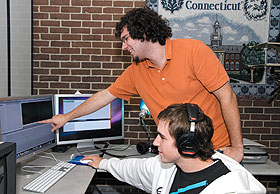  |
| HOME | THIS ISSUE | CALENDAR | GRANTS | BACK ISSUES | < BACK | NEXT > |
Video editing technology now available to students at Library by Sherry Fisher - October 14, 2008 | ||||
| Two new multimedia studios equipped with the technology for editing videos are now open to students. The studios are located in the Learning Commons on level 1 of Homer Babbidge Library. The studios include a DVD recorder/VCR combo, a photo scanner, and a powerful computer that offers both Windows and Macintosh software. There are two monitors for viewing and editing, and a production monitor that adjusts color. The multimedia studios were a gift from the Class of 2007. “Everything in the Learning Commons is designed so that students can get their academic assignments done,” says Steven Park, manager of the Learning Resource Center. “We offer help in math, writing, and computers, and found that instructors wanted to be able to give video assignments as well.” Park notes that faculty and staff have the same equipment and instruction available to them at the Instructional Resource Center. He says the multimedia studios, which are for academic use only, provide students with high-end technology that they couldn’t afford on their own. “There was definitely a need for video editing equipment,” he says. Some of the initial requests came from foreign language professors. “For example, a foreign language professor may want students to make a television commercial about shampoo in French,” says Park. “Another professor might ask students to create a short skit in German.” In the area of foreign languages, the spoken word is just as important as the written, he notes. The ability to edit video makes it so that students aren’t pressured to videotape something perfectly on the first take, Park says: “They won’t be forced to videotape something over and over again until it’s just right.” The studios are open to undergraduates and graduate students in every academic area. Students may want to use the equipment to jazz up a video presentation they’re creating by adding text, a special introduction, or transitions. “This is the YouTube generation, and they want to be able to edit video,” says Park.
“They can’t do this type of work on their laptops. They still need this extra, expensive equipment.” He predicts there will be more and more academic contexts where video assignments will be given. “Instead of writing a 10-page paper, students might be asked to create a 10-minute video,” he says. “This is a very visual generation, who never knew a world without the Internet. They grew up in a world where visual images are more powerful for them than the word on paper.” Park, who teaches history at the Avery Point Campus, adds, “It’s not that the term paper is going away. Students still need to be able to write well and have high levels of reading comprehension, so videos aren’t a substitute for that. It’s in addition to it. It’s literacy, a visual literacy.” Students who wish to use the studios are given a short interview about the purpose of their project, the expected outcome and what equipment they will require. They will be asked questions such as, “Are you trying to make a DVD? Are you ultimately going to upload it to YouTube to share or to HuskyCT? Where are you headed? What equipment will you require?” Many students have approached the multimedia studios hoping to make copies of commercial DVDs they’ve rented or bought. That’s part of the reason they’re interviewed, says Park, who takes the opportunity to educate them about intellectual property issues. He says these interviews give him a sense of what students need, and help him plan for the future. The interviews are conducted by Student Educational Technology Assistants (SETA), who also help students with their projects. The SETAs receive intensive training in the software. For reservations to use the multimedia studios, call 860-486-1187. Walk-ins are accepted, but reservations are preferred. Appointments are for a minimum of two hours. |
| ADVANCE HOME UCONN HOME |

